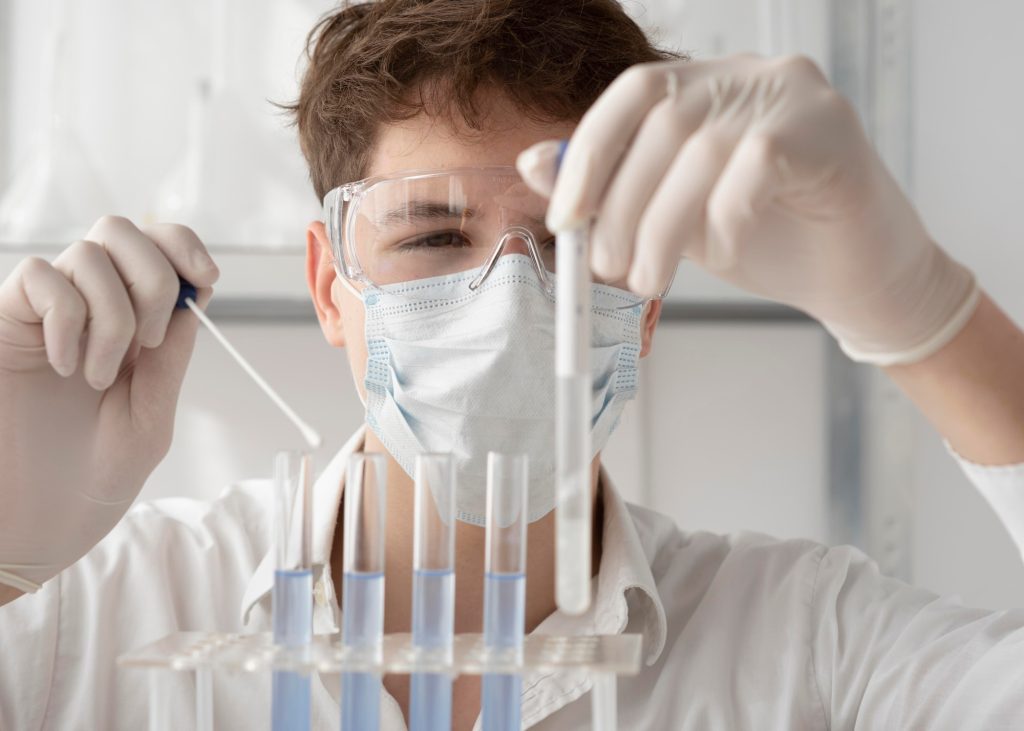- Home
- Departments
- Biochemistry Laboratory

Biochemistry Laboratory
HRS Hospital Biochemistry Laboratory offers fast and reliable results with its advanced technology infrastructure. Our laboratory provides a wide range of biochemical tests to support diagnosis and treatment processes, adhering to strict quality control standards. Our experienced team aims to ensure the highest level of patient satisfaction through accurate and precise analyses.
General Information
Microbiology and Biochemistry Laboratories
All tests in the Microbiology and Biochemistry Laboratories are conducted under the supervision of our dedicated specialist physicians. Our extensive test portfolio includes:
- Blood biochemistry tests
- Hormone tests
- Antenatal screening tests
- Tumor markers
- Hematological tests
- Coagulation and blood grouping tests
- Urine tests
- Cultures and antibiotic susceptibility tests
- Hepatitis markers
- TORCH panel tests
- Other infection-related tests
Our laboratories operate 24/7 to provide accurate, reliable, and fast results for both inpatient and outpatient diagnosis and treatment. All analytical instruments, systems, kits, devices, and consumables used in our laboratories comply with CE and IVD standards and hold internationally recognized scientific and clinical certifications. To ensure the accuracy and reliability of test results, we implement strict international external quality control and daily internal quality programs.
Biochemistry Laboratory
The Biochemistry Laboratory is a critical unit that analyzes the body’s biochemical processes, providing essential information about health status and playing a key role in disease diagnosis. As one of the cornerstones of modern medicine, biochemistry enables the evaluation of normal physiological functions and pathological conditions through chemical and biological tests. By accurately assessing patients’ health conditions, our Biochemistry Laboratory contributes significantly to determining the most effective diagnosis and treatment methods.
What is Biochemistry?
Biochemistry is the branch of science that studies the chemical structures, functions, and metabolic processes of living organisms. The proper functioning of biochemical processes in the human body provides vital insights into overall health and disease presence. The Biochemistry Laboratory analyzes blood, urine, and other biological samples to assess the body’s chemical balance. These analyses are crucial for early disease detection, monitoring treatment progress, and supporting preventive healthcare services.
Biochemistry Laboratory Services
The Biochemistry Laboratory evaluates the body’s biochemical composition through a wide range of tests and analyses. The main services provided include:
1. Blood Tests
Blood tests are among the most common and essential analyses performed in the Biochemistry Laboratory. These tests help assess the body’s chemical balance, organ functions, and metabolic processes. Key tests include:
- Blood Glucose Test: Measures blood sugar levels for diabetes diagnosis and monitoring.
- Lipid Profile (Cholesterol and Triglycerides): Assesses cardiovascular disease risk.
- Liver Function Tests: Measures ALT, AST, ALP, bilirubin levels to evaluate liver health.
- Kidney Function Tests: Assesses creatinine, urea, and eGFR levels to monitor kidney function.
- Electrolyte Levels: Evaluates sodium, potassium, and calcium levels for fluid balance and organ function.
- Hormone Tests: Includes TSH, LH, FSH, testosterone, and estradiol to assess endocrine system function.
2. Urine Tests
Urine tests evaluate the body’s ability to eliminate waste and assess kidney function. Common tests include:
- Urinalysis: Measures pH, protein, glucose, and urobilinogen levels in urine.
- Urine Culture: Detects infections by analyzing urine samples.
- Urine Sediment Examination: Provides insights into kidney diseases and urinary tract infections.
3. Metabolic and Enzyme Tests
Measuring enzyme levels helps evaluate organ health and metabolic function. Common tests include:
- Lactate Dehydrogenase (LDH) Test: Provides insights into cell damage and certain cancers.
- Amylase and Lipase Tests: Used for diagnosing pancreatic diseases.
- Alkaline Phosphatase (ALP) Test: Helps detect liver, bone, and bile duct diseases.
4. Vitamin and Mineral Tests
Analyzing vitamin and mineral levels helps detect nutritional deficiencies and metabolic disorders. Common tests include:
- Vitamin D, B12, and Folic Acid Tests: Identify deficiencies and guide supplementation needs.
- Iron, Magnesium, and Zinc Tests: Detect mineral imbalances.
5. Toxicology and Poisoning Tests
Analyzing harmful substances in the body is crucial for diagnosing poisoning cases. The Biochemistry Laboratory can test for alcohol, drug toxicity, and environmental toxins.
6. Genetic Tests and Biomarkers
Genetic analysis and biomarkers help personalize treatment approaches. Genetic tests are used for diagnosing hereditary diseases, while biomarkers play a crucial role in the early detection of conditions such as cancer.
Importance of Biochemistry Tests
Biochemistry tests provide fundamental data for evaluating a patient’s health status. These tests are critical in:
- Early Diagnosis: Many diseases show no symptoms in the early stages. Biochemical tests help in early detection.
- Treatment Monitoring: Essential for assessing the effectiveness of treatment and tracking patient response.
- Biochemical Balance Maintenance: Helps detect imbalances that could lead to serious health issues.
- Preventive Healthcare: Identifies potential health risks in high-risk individuals before symptoms appear.
Biochemistry Laboratory Process
The test process in the Biochemistry Laboratory follows these steps:
- Sample Collection: Blood, urine, and other biological fluids are collected from the patient as required.
- Analysis and Testing: Laboratory specialists analyze the samples and measure biochemical parameters.
- Results Evaluation: Expert biochemists examine and interpret the test results. Additional tests may be performed if necessary.
- Report Generation: The results are shared with physicians to aid in treatment planning.
Conclusion
The Biochemistry Laboratory plays a vital role in providing critical health data, ensuring accurate disease diagnosis and effective treatment. Every test contributes to understanding the body’s biochemical status and determining the best course of action for patient care. Regular biochemical testing is an essential part of health management, and our laboratory ensures high standards in accuracy and speed for optimal patient outcomes.
Randevu Al
Hastanemiz bölümlerinden bir tanesinden randevu almak için lütfen aşağıdaki butona tıklayın.
Bizi Arayın
Sağlığınız ile ilgili herhangi bir sorun yaşadığınızda lütfen bizi arayın….
